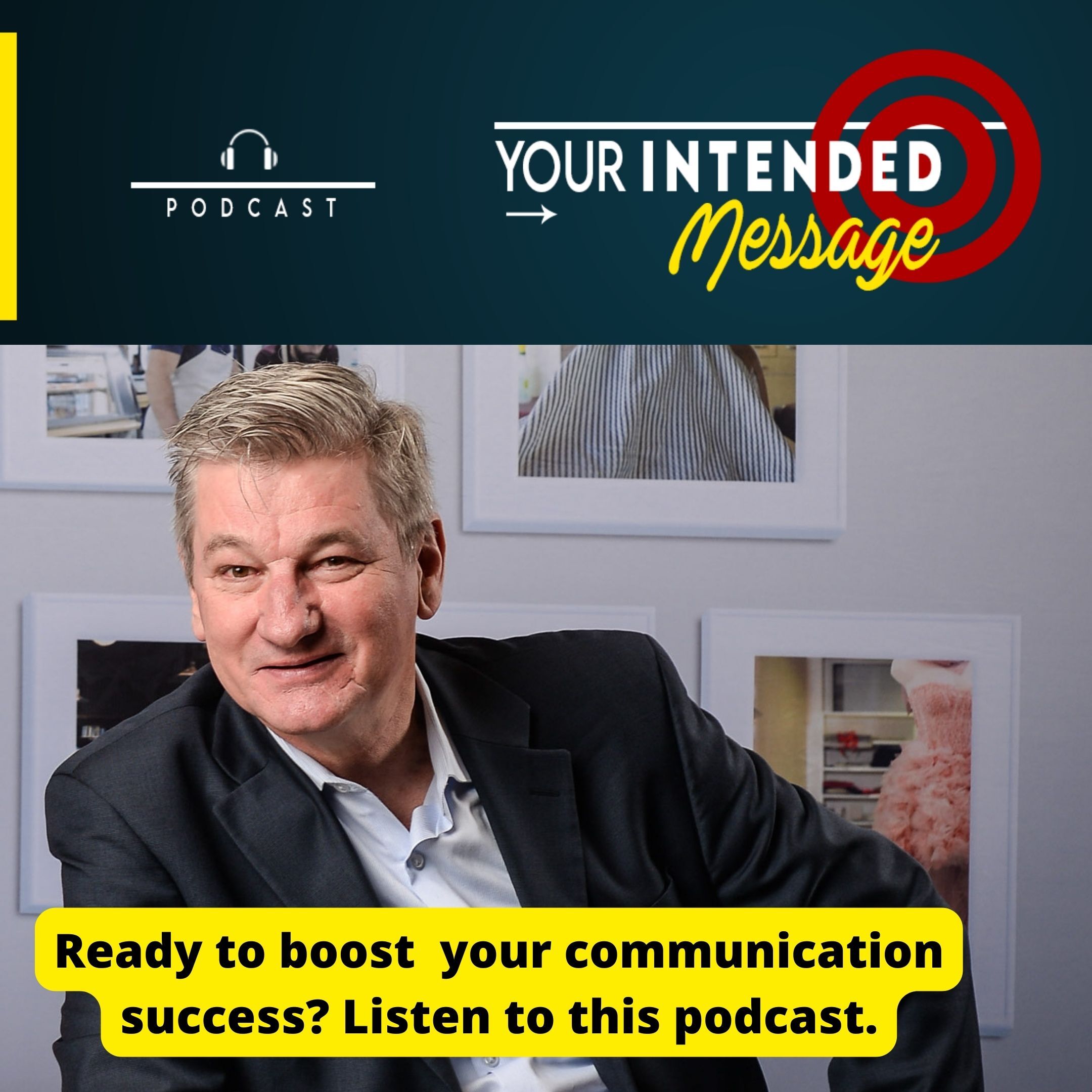
17.4K
Downloads
291
Episodes
The podcast about Effective Communication in Business
Better communication skills will advance your career and business. Are you ready to enhance your understanding and results from better communication? Listen and learn how to deliver Your Intended Message.
Are you willing to cross-examine communication from various perspectives? Would you like to deliver your intended message more effectively?
Listen to Your Intended Message to gain a powerful advantage in your ability to convey your message to your audience, team, clients or marketplace.
Learn from the mistakes and success of communication experts from around the world from different scenarios.
The better communicator has the competitive advantage.
Imagine what that means to you when you improve the success of your next conversation, presentation or message.
Your Host - George Torok
https://yourintendedmessage.com/
The podcast about Effective Communication in Business
Better communication skills will advance your career and business. Are you ready to enhance your understanding and results from better communication? Listen and learn how to deliver Your Intended Message.
Are you willing to cross-examine communication from various perspectives? Would you like to deliver your intended message more effectively?
Listen to Your Intended Message to gain a powerful advantage in your ability to convey your message to your audience, team, clients or marketplace.
Learn from the mistakes and success of communication experts from around the world from different scenarios.
The better communicator has the competitive advantage.
Imagine what that means to you when you improve the success of your next conversation, presentation or message.
Your Host - George Torok
Episodes
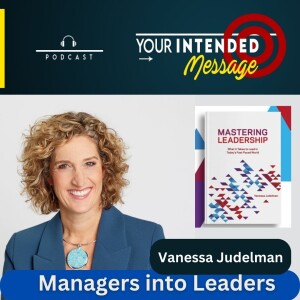
Thursday Jun 20, 2024
Transform Managers into Leaders: Vanessa Judelman
Thursday Jun 20, 2024
Thursday Jun 20, 2024
Helping managers become executive leaders
Leading is different from managing
Episode 212 (Vanessa is based in Toronto, Canada)
In this conversation with Vanessa Judelman we explore:
- The three aspects of being strategic
- How to conduct an accountability meeting
- The power of regular one-on-one meetings with your people
- How to build trust with your team
- How to become a leader who coaches your team
- Why and how to become a better listener
- How to delegate effectively
About our guest, Vanessa Judelman:
Vanessa is a leadership consultant and executive coach. Over the past 20 years she has trained and coached thousands of people across the globe in organizations including Campbells Soup, HelloFresh, the SickKids Foundation and the Four Seasons Hotels and Resorts.
Learn more about her book
"Mastering Leadership: What it Takes to Lead in Today's Fast Paced World" at: www.mosaicpd.com
------
Excerpts from this conversation with Vanessa Yudelman:
And I just want to develop the muscle of listening because I it's not something that we were taught at school.
-----
I always tell leaders, first of all, think about your intention for the meeting. Why do you want to meet with them?
Is it an accountability meeting where you want to make sure they're, they're moving their goals forward? Is it a coaching meeting, where this is someone who's new, and you want to develop them? Like, what's the purpose?
So that's the first place to start is, so I would recommend you identify the purpose, then share it with your team? You know, a lot of leaders think that just because they're a leader, they have to have all the answers. And I always say that's not true.
You, as a leader need to have the questions.
You don't necessarily need to have the answers. So say to your team, hey, you know, I really feel like I'm not getting you're new to the team and not giving you enough time to develop your skill in this area. And so I was thinking we could do a one on one.
Would that be helpful for you? Again, check in? Oh, yeah, that'd be great. Okay, let's do the agenda together. Here's what I was thinking. I was thinking, like, I always asked, you know, what the suggestion I was thinking we could talk about, you know, this certain skill, what did you do to work on the skill last week?
What are some of your gaps, what support you need for me? Right. And so again, it's a lot of questions. And by giving them the agenda in advance, people know what to expect, and they can prepare for the meeting.
So they know, every Monday, you know, my leader is going to ask me what I did to work on the skill last week, and where I'm still feeling stuck. So you can either Yeah, so those are a couple of suggestions to get those meetings started.
-----
Read the rest of this entry »
Thursday Jun 13, 2024
Are You an Entrepreneur with ADHD? ST Rappaport
Thursday Jun 13, 2024
Thursday Jun 13, 2024
How to improve your thinking skills regardless of your strengths
Strengths and opportunities for ADHD entrepreneurs
Episode 211 (ST is based in Florida)
In this conversation with ST Rappaport we explore:
- Appreciating the 28 thinking skills
- How to recognize ADHD challenges
- How to deal with overwhelm
- How to leverage our five senses to organize new information
- The three phases of thinking and how to
- Why ADHD people can be the movers and shakers
- How to use curious questions and learning to keep your brain young
About our guest, St Rappaport:

-----
Excerpts from this conversation with ST Rappaport:
I think that people with ADHD are the real movers and shakers of this world. Anyone who's done anything really big in this world, most definitely has ADHD. And I just love being around such people.
-----
And sometimes it's a good idea not to consider all the details, because if you did, it would overwhelm you and scare you.
-----
Do you believe that people can multitask?
No.
What we do is we task switch. Yes, we are switching tasks really, really quickly from tasks that is includes if you have ADHD, and a lot of people think they have ADHD, and they can multitask really well.
But if you observe yourself, what you're actually doing is you're switching from task to task really, really quickly. only exception to this is when you're doing a task that doesn't require brainpower.
Then let's say for example, if you're driving driving down the highway, 60 miles an hour, and it's like, just not thinking and you have a podcast playing, you could still be listening to your intended message, right?
You're still listening to the podcast. However, if out of nowhere, a car comes and cuts you off. Or all of a sudden, like there's a bike that like a pedestrian or something that you think you weren't expecting those few seconds to settle and stop and you were focused on the road,
You're more focused on the road, your brain didn't hear what was in that podcast, you will literally if you want to hear what was said, we'll have to go back there a couple of seconds to hear it because your brain was shut off.
So you can multitask until one of the things don't need brain power.
-----
You want to make sure you are always, always always always doing new and challenging tasks. If you want to keep your brain young, you want to do new and challenging,
not just new and not just challenging, but those two together, those are the best way for you to keep your brain young and provide any of the elderly diseases that none of us want related to the brain.
-------
Read the rest of this entry »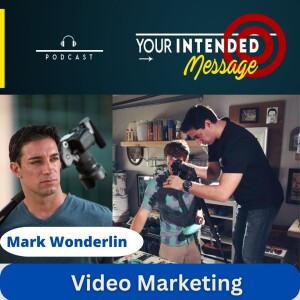
Wednesday May 29, 2024
The Top Three Videos Your Business Needs: Mark Wonderlin
Wednesday May 29, 2024
Wednesday May 29, 2024
How to promote your business with video
What are your video choices?
Episode 209 (Mark is based in Austin, Texas)
In this conversation with Mark Wonderlin we explore:
- Where to start with simple phone videos
- What are the different types of videos you can publish for your business
- Why value in the video content is more important than quality
- The best uses of selfie videos vs professional videos
- Understand the intent of viewers on the different social media
- How long to make your video depending on the platform
- How to split a longer video into to short videos in a funnel
- How to start by shooting your own video
About our guest, Mark Wonderlin:
Mark is owner of Mosaic Media Films, the highest-rated video company in Austin Texas.
His team creates cinematic business videos with marketing in mind.
He loves to travel and much as he loves creating video content.
-----
You can access the free video resources at his site
https://mosaicmediafilms.com/resources/
-----
Excerpts from this conversation with Mark Wonderlin:
What kind of videos should they be producing at first? Where do you start that?
So most of the time, when clients are looking for video from us, they're looking for typically what's called a business promo video. And that's usually where we try to steer them.
So the conversation that we have about video is a little bit different than most other production companies out there. I really want to understand what are you doing for marketing? what's working, what's not working?
What is the problem we're trying to solve that this type of video or other types of videos will help solve in your marketing strategy. So sometimes it's a promo video, sometimes it's a case story, or testimonial video, sometimes it's a series of videos that work in your funnel to increase trust and credibility.
So we really try to understand what is the problem that they have? And how can video what type of video will work, or what series of videos will really help them.
The two most popular videos that we do is what's called a business promo video. Some people call it a company video, some people call it a Brand Story Video, it's essentially a two minute video that tells the story about what you do, and what makes you uniquely different.
And I say tells the story about you very lightly, because I often have to explain to clients that it's not really a story about you, as much as is a story about your customers journey.
So it's really about what is the problem or the pain that your customer has? How could you uniquely solve that? And what does their life look like, once you've worked with them.
And that's really what you want to do. Because However, people are seeking you out with your primary marketing objectives, whether it's SEO, or pay per click or social, when they come into your business or brand, they essentially are acknowledging that they have a problem. And they want to make sure that you can kind of solve that problem.
They're there's a story that they're already playing in their head, and they want someone that's gonna help change and transform that story, whether it's in the form of a product for a result that they want, or a service, or an objective that they're trying to achieve in their life, whether it's their business, or personally.
-----
Read the rest of this entry »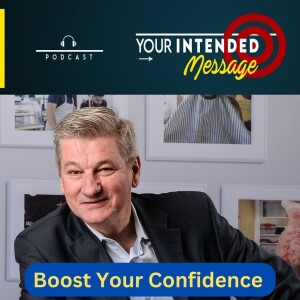
Thursday May 23, 2024
Feel more Confident and Appear more Confidence: George Torok
Thursday May 23, 2024
Thursday May 23, 2024
If you had to choose between feeling confident or appearing confident what would you choose?
Listen in to discover the answer and why it is important to you.
In this solo show George offers you a whole body. mind and soul experience to enhance your confidence.
Insights from this episode about feeling and appearing confidence when you speak in public.
These quotes from your episode were generated by Headliner AI. If you enjoy them please tell other podcasters by giving a shoutout to https://headliner.app in your episode ✨
---
🗣️ Quotes from George Torok
"How can you be more confident when it's your turn to speak?"
"It's more important that you appear confident."
"The audience doesn't need to know what's going on in your head or in your body."
"Clarify your purpose by asking yourself this three-part question: As a result of this presentation, what do you want people to think, feel, or do?"
"Don't read it, know it, and then deliver it."
"Remember to breathe."
"When you smile, you are more attractive."
"Believe in yourself and your ability."
"Your message has value."
---
Read the rest of this entry »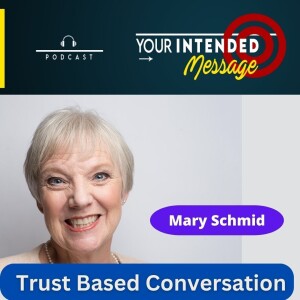
Thursday May 16, 2024
Build the Conversation on Trust: Mary Schmid
Thursday May 16, 2024
Thursday May 16, 2024
Everything begins with a conversation
A solid conversation starts with trust
Episode 207 ( Mary is based in Minnesota)
In this conversation with Mary Schmid we explore:
- Why do 9 out of 10 conversations fail?
- How are the chemical releases in the brain shaping your feelings?
- Why we don't trust when we are stressed or threatened
- Why we don't make pure logical decisions
- The three levels of conversation
- How to move conversation to cooperation
- How to lead with trust
About our guest, Mary Schmid:
Mary Schmid, MBA, has expertise in trust-based conversations. As the author of “Make or Break Conversations,” she offers valuable insights rooted in neuroscience.
With her deep understanding of evidence-based neuroscience, Mary delivers transformative programs that elevate good conversation to trust building interactions.
Mary’s unique ability lies in translating scientific knowledge into practical, actionable steps that you can apply in your next conversation, ensuring others feel heard, seen, and valued.
-----
Connect with Mary on Linkedin
https://www.linkedin.com/in/maryschmid/
Learn more about her services at the website
-----
Highlights from this conversation with Mary Schmid:
Practice active listening skills like paraphrasing, asking open questions, and summarizing to build understanding.
Slow down conversations and take time to discover other perspectives before deciding on solutions.
Prepare for difficult conversations by getting clarity on the purpose and considering different perspectives.
Use plain language instead of jargon to be understood and build connection.
Get to know team members personally before instituting changes as a new leader.
-----
Exactly. And what really happened in the brain before those good feelings, feeling in sync is that something happened in that conversation, who knows what it is, it's verbal, it's nonverbal is a feeling or a memory that you've had talking to a person perhaps like this person that was good, it just felt good.
What really happened is your brain sensed respect, safety. And all of a sudden, it opened up. So what happened is when your brain senses this respect, and safety and going back and forth, talking with each other, there's a chemical release called oxytocin.
And oxytocin opens up the prefrontal cortex, the smart part of our brain, the executive part of our brain that's responsible for innovation, problem solving, connection, cost, and it feels like a good conversation.
But what happens preceding that feeling like it was a good conversation was this invisible chemical reaction that happens in your brain, and my brain and the brain of all humans.
-----
There's three levels of conversation, and one is not better than the other. That's what people immediately think like, Oh, my God, I know that we need to understand the three levels, and how we can use them and how they impact the people so that our intended message reaches the people rather than go astray.
So the first level of conversation is what I call an informational conversation. We use it all day long. In our life, you ask a question, I give an answer. Here's, where's the meeting? What time is this? What's where do we go for that? Question? Answer? That's fine. Sometimes that's all we need is to get the question answered, and get the information.
However, when we're in conversations, when we're in meetings with other people, I think we need we may need more than just a question and answer to build trust. Because data, information, logic does not build trust. So we're in a meeting, perhaps, and we ask a few questions, you know, we're not totally blind to other people.
So we ask a few questions. And what our brain does is it automatically says, Oh, I know the answer. I'm going to tell them. So with a few pieces of information, a little bit of data, lickety split, away we go, we talk to people and tell people what to do based on a limited amount of information.
And we think that's going to do the trick. We're thinking that we're being helpful, but we're really not we're shutting them down. And so we not only tell them what to do, we are really helpful, George, and we're going to tell them how they need to do it.
------
Read the rest of this entry »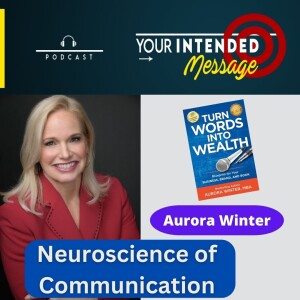
Thursday May 09, 2024
Neuroscience of Communication: Aurora Winter
Thursday May 09, 2024
Thursday May 09, 2024
How to Turn Words into Wealth
How to meet the needs of your three brain barriers
Episode 206 (Aurora is based in Vancouver)
In this conversation with Aurora Winter we explore:
- How does the brain understand words
- The wrong way to communicate
- The three levels of brain activity
- The critical role of the croc brain
- The connection between the mid brain and cerebral cortex
- The 27x effect of adding a story of significance
About our guest, Aurora Winter:
She's the award winning Best Selling Author of half a dozen books, including Turn Words into Wealth, A blueprint for your business brand and book to create multiple streams of income and impact
Aurora learned how to reinvent herself and her life the hard way, when her 33 year old husband died suddenly leaving her widowed with a four year old son.
She later learned how to master reinvention and pivoting and has launched three different businesses in different industries, which grew each to over seven figures.
Learn more about Aurora and her services at:
Check out her latest fiction books at
MagicMysteryAndtheMultiverse.com
-----
Excerpts from this conversation with Aurora Winter
"It's our heart that provides the meaning and purpose and the values."
"The right words in the right sequence, to the right audience, can change your mind, can change your business, can change your wealth in 20 minutes or less."
"Human beings survived over the millennia by being cautious about where they want to expend calories or expend fat. The brain uses a lot of fat to process information."
"We buy with emotion, we take action with emotion, either something we want to move toward or something we want to move away from."
"People love to be a part of something that's bigger than themselves. People are hungry for meaning and purpose."
-----
In the world of communication, the difference between a missed opportunity and a life-changing conversation can be as simple as choosing the right words. This week's podcast episode features Aurora Winter, a master of reinvention and a beacon of wisdom on how to leverage language for success.
Aurora's journey is nothing short of inspiring. From the tragic loss of her husband to building million-dollar businesses, her experiences have culminated in a profound understanding of how to craft messages that resonate. In our conversation, Aurora delves into the neuroscience of communication, explaining how the brain processes information and why this matters for anyone looking to make an impact.
With her book, "Turn Words into Wealth," Aurora provides a blueprint for those seeking to create influence and generate income through effective communication. She emphasizes the importance of addressing the 'croc brain' with a compelling hook, engaging the social 'midbrain', and finally, satisfying the intellectual 'cerebral cortex' with the substance of your message.
But it's not just about the science. Aurora's approach is deeply rooted in the heart. She believes that numbers can't provide meaning and purpose—our values and passion do. Her insights on the emotional and social triggers that drive human behavior are invaluable for anyone from entrepreneurs to leaders to aspiring professionals.
Listeners will find themselves armed with actionable tips, from crafting attention-grabbing titles to framing their offerings in a way that adds value and builds trust. Aurora's advice is a testament to the power of generosity and authenticity in building a brand and a legacy.
This episode is a must-listen for anyone ready to elevate their communication game. Whether you're pitching a business idea, writing a book, or simply looking to connect more deeply with others, Aurora's guidance will help you turn your words into a wealth of opportunities.
So, if you're eager to learn how to articulate your mission, convey your value, and truly connect with your audience, tune in to this enlightening conversation. It's time to transform your words into a tool for unparalleled success.
Listen to the full episode now and join the ranks of those who know that the right message, delivered the right way, can indeed change the world.
-----
Read the rest of this entry »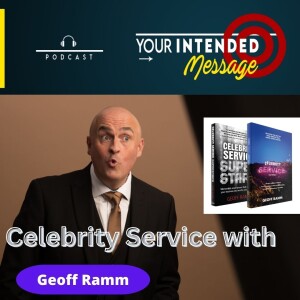
Thursday May 02, 2024
How Can you Deliver Celebrity Service? Geoff Ramm
Thursday May 02, 2024
Thursday May 02, 2024
Why did Forbes call Geoff Ramm a Game Changer?
Why the extra mile and exceeding expectations is not enough
Episode 205 (Geoff is based in north east England)
In this this conversation with Geoff Ramm we explore:
- What is the key question you need to ask to surpass the competition?
- How would you treat the A list celebrity differently?
- How would you serve George Clooney or Angelina Jolie?
- How big or small is the gap to deliver celebrity service?
- How to forge a strong emotional connection with your audience
- Why is personalization and how might you apply it to your business?
- What can you learn from successful customer service stories
- What's the difference between good service and celebrity service?
About Our Guest Geoff Ramm:
Forbes stated "Geoff Ramm is a Game Changer in the world of customer service".
He is the author of two books, Celebrity Service and Celebrity Service Super Stars.
He has delivered his message to audiences in 50 countries.
Learn more about his books and service at
-----
Excerpts from this conversation with Geoff Ramm:
For anybody listening, I've got my hand up quite high, Jeff, we're pretty good. But there's always room for improvement.
And I will challenge the audience and say, Where does that improvement come from? Because if you go the extra mile and exceed expectations, those are the words that your competition are talking about right now.
And I said, in six months time, you'll have all got, you know, an extra mile further forward. But it's hardly the LEAP you could make unless you change your mindset.
And you change your mindset with one question. And that question is a philosophy. It's a philosophy that I've wrote about, that I speak about all over the world. It's the philosophy that every audience, every team, every brand gets within seconds.
And this is what I hope Forbes may have just seen in me. So as you write, how do you go from a seven to an eight to a nine to a 10? And beyond?
It's this one question if your next customer, client, passenger member, guest, we're an A list, celebrity, Hollywood, God, or goddess, if your next client were Taylor Swift, George Clooney, Denzel Washington, what would you say?
What would you do? How would you react? What would be the difference in the way that you would treat them?
-----
But what I have George on screen, and you've seen this many times, when we've spoken internationally together, I show pictures of my daughter, and her love for coloring in and an art.
And so I show these photographs of when she was little coloring in and so the audience can see what my dog, they know her name, they know what she loves.
But now they can see her. And that connection to the audience is very, very strong. But I'm telling the story of this experience in a toy shop.
But I see the funny and I see the quirky and all of the stories that I tell. And it was a beautiful piece of selling, it was a beautiful piece of customer experience.
But it was all about personalization, which I talk a lot about, because people talk about personalization. But I don't see many examples. So when I deliver my stories, they're packed full of examples. But hopefully, there's some key tips and learnings from that that a business can go.
-----
Read the rest of this entry »
Thursday Apr 25, 2024
Write Emails with Purpose, NOT by Accident: Liz Danziger
Thursday Apr 25, 2024
Thursday Apr 25, 2024
Write email that gets you the results you want.
Avoid sending email that shows up in the news, or in court
Episode 204 (repeat of #134, Liz is based in L.A.)
Listen to this conversation with Liz Danziger before you send that toxic email and save yourself grief.
About Liz Danziger:
Liz is the author of four books published by major publishers including business writing guide, Get to the Point! She is also a columnist on Inc.com
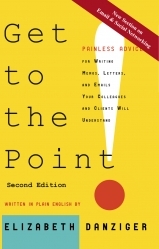
She has decades of experience in helping teams to write clearly and confidently.
Her goal is to empower people to wield the power of words to create success.
To receive her monthly writing tips called Writamins visit www,WorkTalk.com
At the same site you can get your copy of Ten Tips for Communicating Effectively in a Fast-Paced World.
You can arrange a complimentary 30-minute call to explore communication issues in your organization. Select a time on her calendar
------
Excerpts from this conversation with Liz Danziger:
Mistakes that right off the bat, you could say, okay, stop doing this, this and this, and people's writing will dramatically improve?
Yes, one thing is that they could know their purpose before they start and know their point before they start. My view is that most writing problems happen before a person starts to write.
They happen in the thinking phase when people don't think about their purpose. And that's why I'm so pleased to be on this podcast, your intended message, because that's exactly what the worktop trainings are about is having people be clear on their intentions, and then target their readers.
And so the first thing is to know your purpose and your point. The second thing would be to think about your reader it astonishes me sometimes, how people will just sit down and they're just tap it, tap it tap, but they're writing away.
And then if I stopped them in coaching or in training, and I asked them, so what do you think your readers interested in? And they're like, oh, that's an interesting question. So they need to think about the reader and they need to use clear language.
And the last thing I will say is, people have to reread before they send. It's a common common error that people just tap it tap and send without proofreading. And they live to bear the consequences.
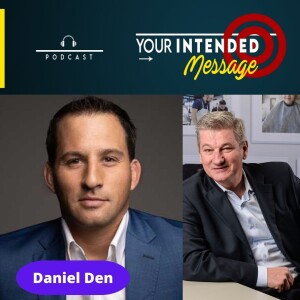
Thursday Apr 18, 2024
Stand out from the competition by being different: Daniel Den
Thursday Apr 18, 2024
Thursday Apr 18, 2024
Do you have copycat competitors?
Does your message sound and look like everyone else?
Episode 203 (Daniel is based in Florida)
In this conversation with Daniel Den we explore:
- How to be so different that they can even begin to copy you
- What is the danger of looking like your competition?
- How can you position yourself in your niche?
- How to layer on more than one differentiating factor
- How to turn your product into an experience
- Why create a family of brands that support each other - like Apple
- How to start defining your difference
- How to describe your avatar to attract the right prospect
About our guest Daniel Den:
Daniel became fascinated with marketing and sales almost two decades ago. Today he is the co-creator of the X Factor Effect methodology where he and his team have helped over 20,000 students and clients grow their businesses. Daniel teaches that “Different is the new Better” and his framework includes nine pillars for differentiating your business so that you can become a market leader or category king or queen.
Daniel Den is the author of the new book "Ideas That Influence," that was built to help business owners discover their own WILDLY SUCCESSFUL MARKETING IDEAS!
-----
Get your Big Ideas Box at
https://www.bigideasbox.com/free-box-ideas-that-influence
-----
Excerpts from this conversation with Daniel Den:
If we are doing things exactly like our competition, then we end up becoming the average of our competition and the average competition goes out of business within about five years.
-----
And what we discovered is that if we take one big difference, but then stack that with another big difference, and then stack that with two or three big differences, additional differences, then you can get to the point where you become such a unicorn in your market, where the barrier of copy ability is just too high.
And where it would be laughable if somebody decided to copy you, after you had implemented all of those differences. And so amongst the nine different pillars that we've come up with, we help people become drastically different to the point where they are a unicorn inside of their market, where they can quickly become a market leader, or a category king or category queen.
And that makes all the difference that makes all the difference.
-----
We call it joining the age of experience. And the age of experience, what we've found, George, is that we all have enough stuff. We all are blessed.
Today, we all have lots of stuff. mass produced, we can pretty much get access to anything. And in today's world, stuff is not what people want anymore. What people want more, is a great experience, and they're willing to spend their disposable income on a great experience.
-----
Any damn fool can put on a deal. But it takes genius, faith and perseverance to create a brand. Dan Ogilvy,
-----
Read the rest of this entry »
Thursday Apr 11, 2024
PowerPoint Success: Ellen Finkelstein
Thursday Apr 11, 2024
Thursday Apr 11, 2024
Make PowerPoint Enhance Your Presentation
Don't be a PowerPoint Fool
Episode 202 (Ellen is based in Iowa)
In this conversation with Ellen Finkelstein we explore:
- Common mistakes to avoid when presenting with PowerPoint
- How to take a more productive approach to your presentation
- How your words, slides and delivery contribute to your success
- Why text on your slides stop people from listening
- How non-designers can create attractive slides
- The importance of practicing your presentation
- Your secret helpers - Text Pane and Presenter View
- Guidelines and tests for effective slide design
- How to fix boring slides
About our Guest Ellen Finkelstein:
She's a PowerPoint MVP and has been one since 2010. That's a Microsoft award and it stands for Most Valuable Professional. There are only 18 in the United States.
Ellen has been training and writing about PowerPoint since before 1999, including several books (written quite a while ago) and her PowerPoint Tip blog.
She isn't a designer so she loves to help non-designers create great PowerPoint slides that communicate clearly, command attention, and help the audience understand and remember the message.
-----
The Techniques that Will Make Designing Your Slides EASY!"
https://www.ellenfinkelstein.com/pptblog/getstarted/
-----
And so that's what how you have to write the content. And I do recommend doing that outside of PowerPoint and it's thinking about what you're saying.
So number two, I'll just go really quickly on the slide poor but everybody knows what death by PowerPoint is there's just lots and lots of text on a slide, slide after slide of text.
There's a fair amount of research that shows that we can't listen and look at the same time. That research is why there are some states that have laws against even being on the phone while you're you're listening to someone and talking to somebody while you're driving.
Okay, because you can't really listen and see at the same time, probably what the person is saying on the phone is a lot more interesting than what's in front of you.
So when you put up a slide with a lot of text, people start to read it, we're more visual, the part of the brain that that takes in visual information is much bigger than the part that takes an auditory information.
People read it, but they can read faster than you could speak. So they read ahead of you, they're not listening. And then when they're finished, they go back to listening to you. And they see that, oh, I've already read that.
So why should I pay attention to the speaker?
-----
That image should help people understand and remember what you are saying.
-----
I mentioned that presenters screen which functions a little bit like a teleprompter, and so the audience doesn't see it, you see your notes that you've put in the Text Pane, but they just see the slides.
-----
Never make text move. So don't make text fly in or fly up.
It's almost always annoying to the audience. Because as the text is flying in, they see it and trying to read it, but it's moving.
It gives people a headache. It's not nice to the audience to do that. So I would say I almost always use either appear or fade, if I'm using it on text, you know, it doesn't move at all.
-----
Read the rest of this entry »